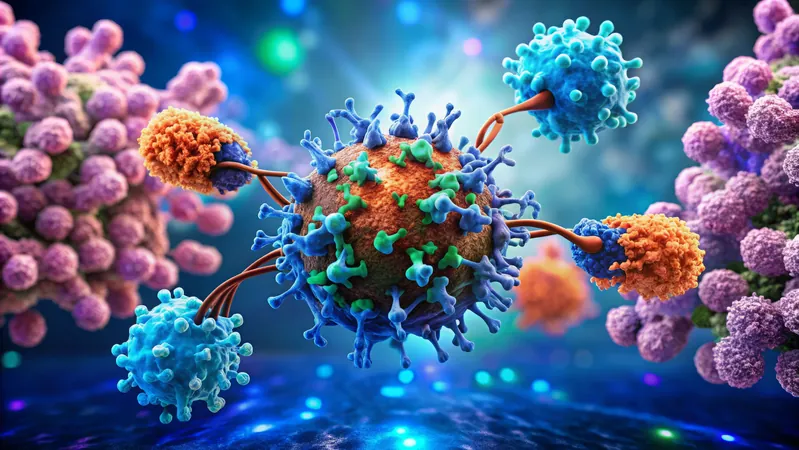
Groundbreaking Study Reveals Cardiac Health as a Crucial Factor in Breast Cancer Progression
2025-01-03
Author: Benjamin
Introduction
Recent research published in JAMA Network Open has uncovered alarming findings regarding the intersection of cardiovascular disease (CVD) and breast cancer (BC). Patients diagnosed with advanced stages of breast cancer are notably more likely to have existing cardiovascular conditions, a link that may expedite tumor growth in hormone receptor–positive (HR+) and human epidermal growth factor receptor 2 (HER2) positive breast cancer cases.
The Link Between CVD and Cancer
CVD and cancer stand as the two leading causes of death in the United States, often sharing multiple risk factors. In fact, a notable 2023 study in JACC: CardioOncology demonstrated that individuals with cardiovascular disease were 13% more likely to develop cancer. This shocking statistic underscores the need for a closer examination of how heart health impacts cancer prognosis and progression.
Breast Cancer Statistics
Breast cancer remains the most frequently diagnosed cancer among women, constituting approximately 30% of all female cancer diagnoses in the U.S. This research has reignited discussions about the significance of heart health in cancer outcomes, especially in a population that is often already at risk due to treatment side effects and lifestyle changes post-diagnosis.
Study Findings
In their extensive study, researchers analyzed data from the Surveillance, Epidemiology, and End Results–Medicare linked databases, involving over 19,000 women with invasive breast cancer, typically diagnosed in their 70s. The study noted a striking correlation: women with locally advanced or metastatic breast cancer at diagnosis also bore a 10% increased likelihood of prevalent cardiovascular disease. This correlation was particularly pronounced in patients with HR+ breast cancer, further highlighting the necessity for integrated cardiovascular care in oncology settings.
Prior Research and Guidelines
What's more, the researchers linked their findings to earlier studies. The Atherosclerosis Risk in Communities study suggests that proper adherence to cardiovascular health guidelines can lead to a staggering 50% reduction in the risk of developing certain cancers, notably breast, lung, and colorectal cancers.
Implications of the Research
These astonishing revelations present new opportunities for proactive healthcare strategies that could drastically alter the landscape of breast cancer treatment. Strategies may include early detection of cardiovascular conditions, targeted interventions aimed at cardiovascular health, and personalized lifestyle modifications for breast cancer patients. For instance, some studies have indicated that initiating statin therapy right after a breast cancer diagnosis can enhance survival rates specific to breast cancer.
Conclusion and Future Directions
The implications of this research are profound. With a collaborative approach that integrates oncology and cardiology, healthcare providers can better manage the intricate relationship between cardiovascular health and breast cancer progression. It is imperative for modern cancer care to adopt a multidisciplinary strategy, emphasizing the significance of heart health in improving patient outcomes, particularly for those facing the dual battles of breast cancer and cardiovascular disease.
As we move forward, these findings pave the way for innovative and life-saving approaches that could fundamentally transform the way breast cancer is managed and ultimately improve the quality of life for countless patients. Will more healthcare professionals embrace this crucial link, or will we continue to overlook the heart's role in battling cancer? Time will tell.









 Brasil (PT)
Brasil (PT)
 Canada (EN)
Canada (EN)
 Chile (ES)
Chile (ES)
 Česko (CS)
Česko (CS)
 대한민국 (KO)
대한민국 (KO)
 España (ES)
España (ES)
 France (FR)
France (FR)
 Hong Kong (EN)
Hong Kong (EN)
 Italia (IT)
Italia (IT)
 日本 (JA)
日本 (JA)
 Magyarország (HU)
Magyarország (HU)
 Norge (NO)
Norge (NO)
 Polska (PL)
Polska (PL)
 Schweiz (DE)
Schweiz (DE)
 Singapore (EN)
Singapore (EN)
 Sverige (SV)
Sverige (SV)
 Suomi (FI)
Suomi (FI)
 Türkiye (TR)
Türkiye (TR)
 الإمارات العربية المتحدة (AR)
الإمارات العربية المتحدة (AR)